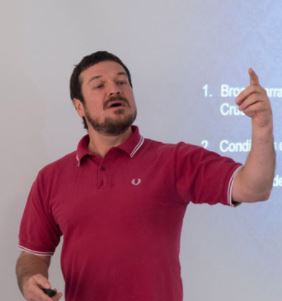1. Causes of the Crusades (ATL)
ATL: Causes of the Crusades
In this page, you will find a variety of different activities and tasks to complete on the causes and motives behind the crusades.
Guide for the ATL
When it comes to these activities, think contextually and think conceptually. In other words, think deeply about larger background factors to the important events and individuals of the first four crusades as well as the key historical concepts through which to make sense and organise your understanding.
Activities:
ATL: Research and Thinking Critically
Defining the Crusades
Use the following link from the Khan Academy on the crusades as a resource.
Questions:
1] How would you define the word "Crusades"?
2] Draw four boxes. In each box, outline what the crusades would have meant to different people in the middle ages. For example:
box 1: a clergyman.
box 2: a peasant.
box 3: a king/emperor.
box 4: the Pope.
ATL: Research and Thinking Critically
Overall Motive for the Crusades
'Most Crusaders were driven by an unshakable determination to conquer the Holy City and complete their pilgrimage to the Holy Sepulchre.'
Thomas Asbridge, The First Crusade (2004)
Task:
1] Make a plan on how you would answer this question.
2] Research any evidence/sources/interpretations from historians that would:
a: confirm Asbridge's claim.
b. challenge Asbridge's claim.
ATL: Communicating and Thinking Critically
Motive: First Crusade
Watch the following video by Thomas Asbridge on the First crusade:
Question:
1] Explain in your own words what the main motivation was for the First Crusades according to Asbridge.
2] Asbridge says (2mins 50):
Their piety is the backdrop to some of the brutality and bloodshed we see enacted in the Holy City when it falls on 15th July 1099; but I also think that piety is a critical factor explaining the Crusader success.
What do you think he meant by this? Discuss.
ATL: Thinking Critically
Crusades: For Love or for Vengeance
Read the article by crusades historian Thomas Madden on the aims and objectives behind the crusades here and reiterated here.
An excerpt is given below:
Urban II gave the Crusaders two goals, both of which would remain central to the eastern Crusades for centuries. The first was to rescue the Christians of the East ...
“Crusading,” Professor Jonathan Riley-Smith has rightly argued, was understood as an “an act of love”—in this case, the love of one’s neighbor. The Crusade was seen as an errand of mercy to right a terrible wrong. As Pope Innocent III wrote to the Knights Templar, “You carry out in deeds the words of the Gospel, ‘Greater love than this bath no man, that he lay down his life for his friends.”
The second goal was the liberation of Jerusalem and the other places made holy by the life of Christ. The word crusade is modern. Medieval Crusaders saw themselves as pilgrims, performing acts of righteousness on their way to the Holy Sepulcher …
The reconquest of Jerusalem, therefore, was not colonialism but an act of restoration and an open declaration of one’s love of God.
Question:
Assess the argument that the crusades was an act of devotion based on love for God. Consider Madden's evidences and arguments.
Set these out in a series of steps (premises) or bullet points.
Now read Susanna Throop's article on crusading as vengeance here helped by a review of her book from here.
Assess the argument that the crusades was an act of vengeance. Consider Throop's evidences and arguments.
Set these out too in a series of steps (premises) or bullet points.
ATL: Communication
Bacon and Holy War

Francis Bacon mentioned that there are five causes for undertaking a holy war:
- to spread the faith;
- to retrieve countries that were once Christian, even though there are no Christians left there;
- to rescue Christians in countries that were once Christian from 'the servitude of the infidels';
- to recover and purify consecrated places that are presently being 'polluted and profaned';
- avenge blasphemous acts, or cruelties and killings of Christians (even if these took place long ago).
Question:
1] Is Bacon's framework helpful as a way of understanding the crusades? Discuss.
ATL: Thinking Critically, Collaboration and Research
The Crusades and Adventure
Read the article by Dr. Jason T. Roche, medieval historian and crusades scholar, on the socio-economic cause of the Crusades. An excerpt is given below for the task:

Scholars in the 1970s offered socio-economic explanations for the origins of the crusades which can be summed up thus: medieval Europe’s overcrowding and conventional systems of primogeniture created a profusion of landless younger sons who had been trained for combat. Without a landed, financial base the young warriors hoped to win the patronage of a great lord or else became free-booters terrorizing western Europe in pursuit of material gain. The crusades were seen to offer solutions to these problems. The papacy was able to direct the martial tendencies of land hungry nobles away from western Europe and towards the Holy Land. These same noble warriors were attracted to crusading because it held the prospect of fighting, offered them adventure, and most importantly, it provided an opportunity for creating a landed base of their own. Urban II and his successors were seemingly concerned with halting and perhaps exporting endemic violence.
![]() Article: Causes of the Crusades - Adventure
Article: Causes of the Crusades - Adventure
Task:
Complete the activity sheet in the link below:
ATL: Thinking Critically
Essay Question
Jonathan Phillips in The Crusades 1095-1197 (2002) writes:
It was the idea of liberating the Christians of the Levant and the city of Jerusalem that stirred the hearts and minds of those that planned the expedition [the First Crusade] and those who took the cross.
Question:
To what extent do you agree with this statement? Discuss.
ATL: Communication and Research
Alexius Comnenus
Question:
1. Explain why emperor Alexius Comnenus appealed to to West for help in 1095?

 IB Docs (2) Team
IB Docs (2) Team

.jpg)